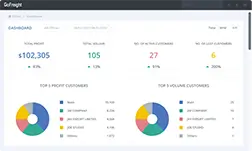Consignee
What is a consignee? A consignee is an individual, company, or entity that is legally designated to receive shipments in a freight transaction. This party is often the receiver of the goods and is mentioned in the transportation documents by the consignor (the shipper) who sends the cargo. The consignee plays a crucial role in […]
Co-Loader
What is a co-loader? In the complex world of freight forwarding and logistics, co-loading stands as a pivotal practice, particularly for optimizing shipments and reducing costs. A co-loader is a logistics service provider that consolidates cargo from multiple shippers into a single container. This process is instrumental in the Less than Container Load (LCL) shipping […]
Declared Value Coverage
What is declared value coverage? Declared value coverage is a critical term in the freight and logistics industry, offering protection and peace of mind to shippers and consignees alike. It refers to the financial protection a shipper can obtain by declaring the value of the goods being transported. This coverage is essential for mitigating financial […]
Express Bill of Lading
What is an express bill of lading? An express bill of lading is a crucial document in the shipping and logistics industry, acting as a contract between the shipper and the carrier. Unlike traditional bills of lading, the express bill of lading facilitates the faster release of cargo to the consignee or buyer without the […]
Centralized Examination Station (CES)
What is a CES? A Centralized Examination Station (CES) is a designated facility where Customs and Border Protection (CBP) conducts thorough inspections of imported goods entering the United States. Unlike standard customs checkpoints at ports of entry, a CES offers a specialized location where more detailed examinations can be carried out without causing significant delays […]
Less than Container Load (LCL)
What is LCL? Less than Container Load (LCL) is a shipping term used in the freight industry to describe a type of transportation for goods that do not require the full space of a standard container. This option allows multiple shippers to share container space, making it a cost-effective solution for transporting smaller volumes of […]
Per Diem Charge
What is a per diem charge? A per diem charge is a daily fee imposed by transportation carriers for the use of their containers or equipment beyond a predetermined free period. Typically, this charge is applied in the freight industry when cargo remains in a carrier’s equipment, like a shipping container, beyond the agreed-upon free […]
Live Unload
What is a Live Unload? Live unload, a critical process in the freight and logistics industry, involves the manual unloading of cargo from a transport vehicle, such as a truck or a shipping container, while the driver waits. This process is distinct from other unloading methods due to its direct and immediate nature. In live […]
Forty-foot Equivalent Unit (FEU)
What is an FEU? A Forty-foot Equivalent Unit (FEU) is a standard measure used in the shipping industry to quantify cargo capacity. One FEU represents the space occupied by a standard forty-foot long shipping container. This measurement is crucial in the world of freight and logistics, as it provides a uniform metric to calculate and […]
Partner Government Agency (PGA)
What is a PGA? A Partner Government Agency (PGA) refers to a government body responsible for regulating specific goods that enter or exit a country. These agencies play a crucial role in international trade, ensuring compliance with various laws and regulations related to health, safety, and security. In the context of freight and shipping, PGAs […]

